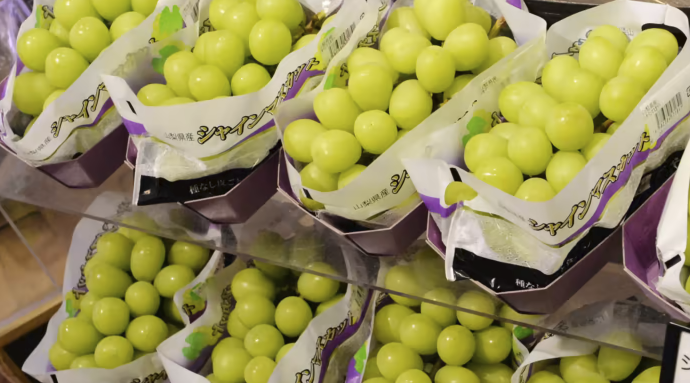Japan sours as premium grape widely copied in China, South Korea
Two neighbors beat Tokyo in Shine Muscat production volume
TOKYO — High-end grape variety “Shine Muscat” is a bona fide Japanese brand, certified by the nation’s agricultural ministry.
Sweet and fragrant, the grapes can fetch $60 or more per bunch at grocery stores. But this prized breed has been widely copied by farmers in South Korea and China, who now beat Japanese counterparts in production volume.
South Korea exports five times more Shine Muscat grapes by value than Japan, while Chinese farmland devoted to the grape is more than 40 times larger than the Japanese figure.
Japanese legislation took effect in April that barred the seeds and seedlings of registered plants and fruits from being taken out of the country, but implementation of the law remains a challenge.
The agricultural ministry recognized in 2016 that Shine Muscat seedlings are being copied and grown outside the country. But without adequate legislation to block such action, production and exports from foreign sources continued to expand.
South Korea surpassed Japan in grape exports by volume in 2019. The South Korean exports reached roughly 800 million yen ($7.27 million) for January-April 2020, up 50% from a year earlier, with Shine Muscats accounting for 90%.
Japan’s grape exports generated 147 million yen during the same period, trailing Seoul’s export volume by a factor of seven.
China and South Korea are the main destinations for seeds and seedlings smuggled out of Japan, according to the Japan Association for Techno-innovation in Agriculture, Forestry and Fisheries.
Japan devotes 1,200 hectares to farming Shine Muscat grapes, compared with 1,800 hectares in South Korea and 53,000 in China.
A 2020 probe by the association also discovered that more than 30 Japanese farm products have been copied and cultivated overseas, including premium strawberries and citrus grown in Shizuoka Prefecture.
The law that took effect in April imposes fines and prison terms for violators. But the transgressions have not subsided. Once seeds or seedlings are taken outside the country, it becomes impossible to track them down.
Japan aims to raise agricultural exports to 2 trillion yen in 2025, followed by 5 trillion yen in 2030. But the current level of 921.7 billion yen failed to meet the initial target of 1 trillion yen by 2019.
Source: https://asia.nikkei.com/Business/Agriculture/Japan-sours-as-premium-grape-widely-copied-in-China-South-Korea

